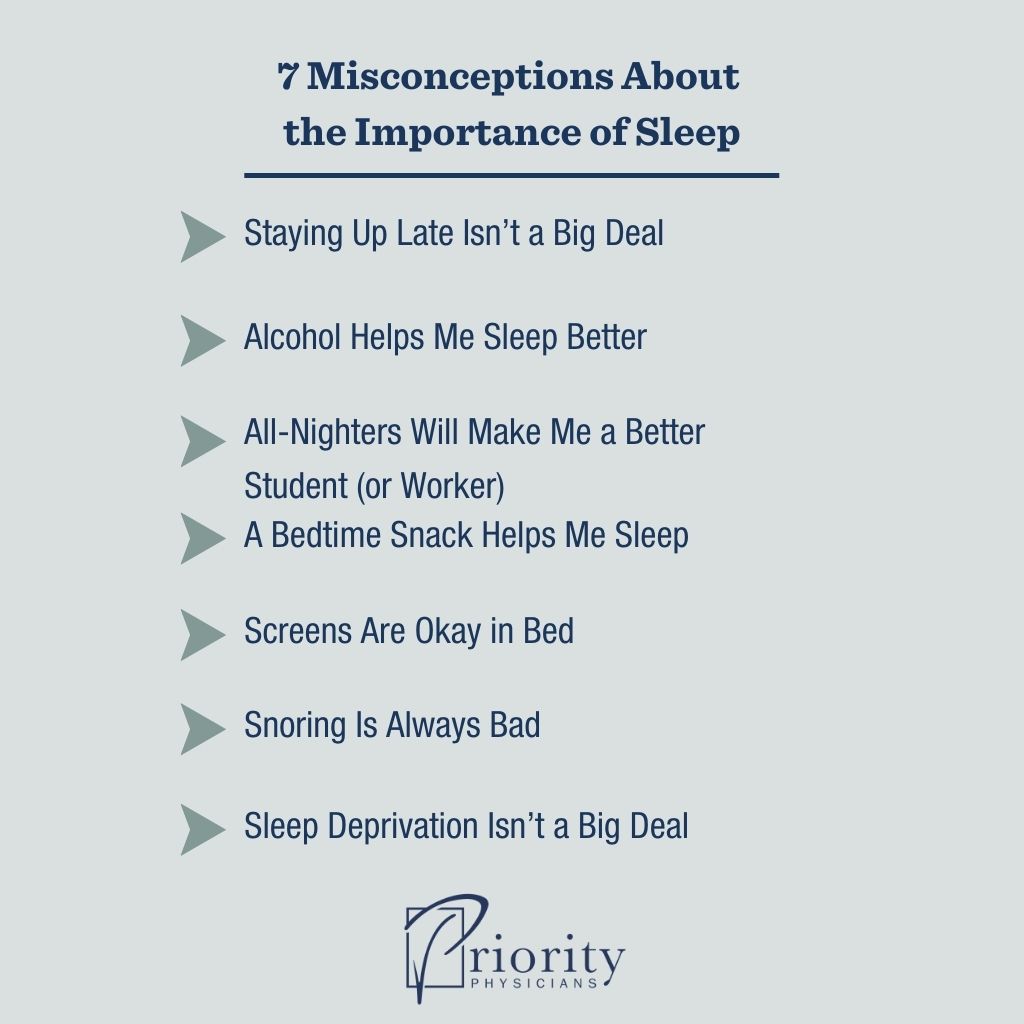“I’ll sleep when I’m dead.”
It’s a common quote most often used by people who (mistakenly) think that sleep is the least important thing on their to-do list. These are often highly productive people to whom sleep feels like a waste of time that detracts from their work and efficiency.
But they’re dead wrong. Here’s why.
What Happens in Your Body When You Sleep?
Dream Your Stress Away
Most of us think of sleep as rest for the body, but it’s just as important for the mind. Sleep allows our minds to process stress and maintain good mental health despite all the stimuli we took in and reacted to during the day. When we lack adequate sleep, our minds don’t have the chance to process and sort through all that input.
Make Memories and Think Clearly
Sleep helps improve memory and cognitive function by organizing information and forming new pathways. As such, sleep is especially important for children, students, and anyone whose job requires a high level of thinking or focus.
Heal and Recover
When you’re recovering from sickness or injury, good quality sleep helps your body to heal itself. Even if you’re healthy and exercise often, your sleep schedule is just as important as your training schedule for maintaining physical fitness.
7 Misconceptions About the Importance of Sleep
1. Staying Up Late Isn’t a Big Deal
Everybody requires a slightly different amount of sleep for optimal function, but most adults need somewhere between seven and nine hours.
You might miss some of your body’s required sleep by staying up late studying, completing a project for work, or finishing a movie. Whatever the reason, you won’t function as well cognitively or physically the next day. You may rely on stimulants like caffeine to keep you productive, which prolongs the cycle by making sleep difficult the next night.
The best way to avoid this cycle of sleep debt is to keep regular sleep and wake times, even on the weekends. Be sure to plan a bedtime that’s early enough each night to give your body the hours of sleep it needs for proper, healthy function.
2. Alcohol Helps Me Sleep Better
Alcohol has a depressive effect, meaning it slows down your nervous system. It can lead to feelings of relaxation and sleepiness, and might even cause you to fall asleep faster. Because of this, many people think alcohol actually improves their sleep.
In reality, your nightcap is destroying your sleep cycle.
As we sleep, our brains need to spend certain amounts of times in the various stages of sleep architecture. One of these stages is REM (rapid eye movement) sleep, which is vital to long-term memory formation, cognitive function, concentration, and mood regulation.
Alcohol throws off the amount of time the brain spends in each sleep stage and also interrupts sleep with increased sleep disturbances. Often, for example, when the sedative effect of alcohol wears off, your body mistakenly believes it’s morning — in the middle of the night. Side effects like upset stomach, vomiting, and diarrhea can also lead to poor sleep.
Even one drink before bed can decrease sleep quality by nearly 10%.
If you drink in the evenings, a good way to limit the negative effects on your sleep is to stick to one drink with dinner (rather than later), include carbs in your meal, and drink water as well.
3. All-Nighters Will Make Me a Better Student (or Worker)
All-nighters are almost a rite of passage for college students and personnel in certain industries or positions. We even glorify it as a sign of hard work and dedication.
However, staying up all night severely impairs your brain’s ability to form new memories — like those needed for the next day’s test. In conjunction with other side effects of sleep loss, such as poor concentration and emotional dysregulation, this causes a detrimental effect on academic grades and workplace performance.
If you want to improve your GPA or work performance, all-nighters are not the way. Instead, start on your work earlier and do a little each day. Give yourself time to practice and review your notes. And, of course, get a good night’s sleep.
4. A Bedtime Snack Helps Me Sleep
When you sleep, your GI tract slows or shuts down, meaning any food you had right before bed just sits in your stomach. This can lead to heartburn, indigestion, bowel issues, and increased body temperature, which can make it difficult to fall and stay asleep.
Instead, try eating several hours before bed, stopping by 8 p.m. or earlier. You can go for a walk after dinner to help food move along in the digestive process. And remember, avoid alcohol and caffeine.
5. Screens Are Okay in Bed
Watching television or scrolling on your phone in bed interferes with your brain’s ability to shut down. Sometimes this is because what you see is engaging your thought processes and not allowing your brain to wind down. But even if you’re watching something “mindless,” screens emit blue light that stimulates alertness and interrupts the production of melatonin, the sleep hormone that regulates circadian rhythm.
Studies have even shown that just keeping your phone near your pillow at night can lead to sleep disturbances.
Ideally, we’d all avoid screens for at least an hour before bed, but 20–30 minutes is probably a more realistic number to shoot for. Instead of scrolling yourself to sleep, try keeping a journal or reading a (physical) book. Put your phone across the room to charge or in a drawer so it’s just out of reach.
6. Snoring Is Always Bad
While not everyone snores when they sleep, snoring is pretty common. Though unpleasant, snoring isn’t a problem unless it causes sleep disruptions.
Snoring occurs when the soft tissues of the roof of your mouth, tongue, or throat relax as you doze off. Allergies, alcohol consumption, a cold or sinus infection, or being overweight can all increase snoring.
Snoring is often associated with sleep apnea, which is a serious sleep disorder. Sleep apnea occurs when breathing repeatedly stops and starts during the night, usually due to an internal airway obstruction. Undiagnosed sleep apnea is a very serious problem that will shorten your lifespan.
However, not all snoring is from sleep apnea.
If you snore, ask your partner if you ever stop breathing while you sleep. Look into getting a sleep study, which you can now do from home, to monitor your breathing at night.
If you don’t have sleep apnea but want to alleviate snoring, you can try elevating the head of your bed or using pillows to slightly elevate your head. Products like Breathe Right nasal strips may also be able to help.
7. Sleep Deprivation Isn’t a Big Deal
Yes, some individuals called “short sleepers” can function perfectly well on little sleep, but they’re very rare. Research shows that most people simply think they’re short sleepers. In reality, they just don’t realize how impaired they are after missing sleep.
So why does that happen?
When you’re sleep deprived, your adrenaline kicks in. Your heart pounds and you feel more alert and hyper-aware of your surroundings. You might feel extra productive in the short term, but in the long term it can have serious side effects.
When you live in a sleep-deprived state, it places stress on your adrenal glands. This is because your adrenal glands are pumping adrenaline and cortisol, a stress hormone, into your bloodstream to keep you in an alert state. This throws off your endocrine system and forces your body to work extra hard just to maintain basic functions.
Are you actually more productive in this state?
Sleep deprivation makes ordinary tasks like driving a car and even chopping veggies for a meal dangerous. Studies show that being awake for 24 hours is the equivalent of being legally drunk. The CDC estimates that drowsy driving causes up to 6,000 fatal car crashes every year.
To avoid the dangers of sleep deprivation, first, never get behind the wheel if you feel drowsy. Additionally, take sleep seriously and commit to developing a plan for healthy sleep.

How To Get Better Sleep Starting Tonight
The first step to getting better sleep is to have a routine. We have routines for most things throughout our day, many of which are much less important than good sleep.
Eat dinner earlier. Set a timer to remind you to get ready for bed. Move your phone charger to another room. Train your brain to wind down and sleep at a certain time every night.
Be intentional and find what works for you. Think about your sleep and make it a priority. Carve out the time to get rest, and protect that routine like your life depends on it.

